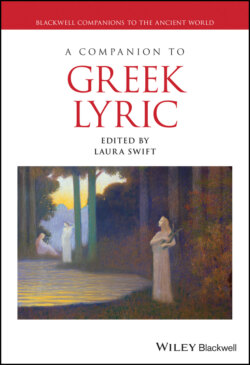Читать книгу A Companion to Greek Lyric - Группа авторов - Страница 25
Pindar’s Second Paian
ОглавлениеWe have raced through the genres—Aeolic monody, elegy, lyric dactyls—and yet, as Herodotus remarked, it is Homer and Hesiod who prevail when it comes to religion. The same gods receive worship, in the same forms, even if poets show preferences: Sappho for Aphrodite, Archilochus for Heracles, Stesichorus for Apollo, and the list could be extended. The most significant finds in the last century of cult poetry are the remnants of Pindar’s paians,70 dithyrambs,71 prosodia,72 daphnephorika, nomoi, and others.73 And here, if anywhere, we have a poet who took his art beyond the Homeric model, although there is much of Homer in Pindar, too.74 Again from Oxyrhynchus a tattered papyrus roll was recovered by Bernard Grenfell and Arthur Hunt in their Victorian-age exploration of Egypt.75 We imagine Pindar’s paians to have been sung and performed by choruses of young men and women, at cult centers such as Delphi and Delos primarily in honor of Apollo and his sister Artemis. Although one might think paians were composed for a particular crisis of the state, as in Iliad 1.472–474, where the Achaeans seek to propitiate Apollo’s wrath at the mistreatment of his priest, that seems not to be true for the majority of the paians written by Pindar, which were composed for calendrical cult. The exception is the ninth, composed on the occasion of a solar eclipse at Thebes, and suitably urgent in tone: here there is lament, and appeal to Apollo who has occluded the sun, giver of light and life. We included a selection of these works in Greek Hymns (including the 9th) but nevertheless these compositions should be revisited here. Let us consider the second, to Abdera.76
The second paian, to Abdera, is a fascinating, if fragmentary, piece which closely binds the genre of paian with military bravery. Without considering the whole piece, which is over one hundred verses, let us grapple with the opening verses. The address is clearly to Abderus (Ἄβδηρε, 1), and it is phrased in the manner of hymnic address, that is, Abderus is given his divine genealogy—son of the Naiad Thronia and Poseidon.77 His military credentials are immediately invoked by the epithet χαλκοθώραξ, “of the bronze breastplate” (1). Thus the paian does not address the city of Abdera directly, but rather the eponymous hero, who is a half-god, being the son of Poseidon. Then comes a first-person statement, possibly by the poet Pindar himself, or possibly by a representative member of the singing chorus. “This paian in your honour I am pursuing with this Ionian company beside Derenian Apollo and Aphrodite.”78 The latter phrase tells us that the paian will be performed at a local sanctuary in Abdera, one combining the worship of a local identity of Apollo, and Aphrodite. The beginning of the sentence is full of difficulties. I take [σέ]θεν with [παι]ᾶνα as a genitive of possession: “your paian” or “a paian to you,” while William Race prefers “beginning with you.” Then comes Ἰάονι λαῶι, a dative which the Loeb editor takes as “for the Ionian people” but I prefer an instrumental sense “with this Ionian company.”79 In other words the poet announces that he will sing Abderus, the eponymous hero of Abdera, through or by means of a company of Ionian paian singers. Either way, we have here a cult song for Apollo Derenos and Aphrodite which foregrounds Abdera, the place. Lozynsky could identify at least four separate “stakeholders”: the gods, the poet, the singers, and the audience.80
After a lacuna of fourteen lines we take up the thread when a voice announces that “I inhabit this fertile Thracian plain” (paraphrase) “… I am a young city; but still, I gave birth to the mother of my mother who had been struck by fire.”81 Pindar riddles deliberately. This is mantic language, deliberate obfuscation. Race prefers to take νεόπολις as “I am of a young city,” but others differ, with them me.82 I think Abdera herself must be speaking and saying “I am a young city.” The riddle with the bearing of the mother’s mother is normally explained with reference to Teos, the mother city of Abdera, which was ransacked by the Persians but then reestablished by the colonists from Abdera. The locals might understand the enigma; difficult for anyone not in the know. There follows a gnōmē about courage producing peace, then the paianic ephymnion ἰὴ ἰὲ Παιάν, ἰὴ ἰέ· Παιὰν / δὲ μήποτε λείποι (“may Paian never wane”). This paian was composed by Pindar for a ritual celebration (as we have said) but it maintains the genre’s links with war. As an army advanced in formation singing the paian,83 no doubt designed to put courage in the hearts of the phalanx and fear in the enemy, so here we have the supreme literary development of what may have started as a mere chant. Pindar has pushed the genre to the limits in a way which brought him fame and much money.84 Of time (following the successful foundation of Abdera) Pindar says literally: “may steadfast time treading mightily not tire for me hereafter” which perhaps means “may things remain good in future.” My point is the hieratic style which Pindar uses to achieve the semnotēs, elevated dignity, suited to paianic prayer.85 The final prayer (104–108) is that Abderus (masculine again) should be victorious in battle.86 Wilamowitz opined that Pindar did not in any sense write “normal” Greek.87 Perhaps the mantic style was supposed to speak directly from, and to, Apollo.
